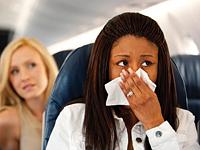Flying the germy skies — and staying healthy
(NC)—What is it about flying that makes travelers more likely to get sick? A recent study concluded that air travel is a primary contributor to the spread of the flu. Leader of the study John Brownstein, professor at the Harvard-MIT Health Sciences and Technology program, said “The number of airline passengers flying in the United States determines how quickly influenza spreads within the United States," and the principle certainly holds true in Canada.
"The more domestic travel, the faster the spread of flu, and the more inbound international travel, the earlier the influenza season begins," he added.
We asked Sherry Torkos, a pharmacist and the author of The Canadian Encyclopedia of Natural Remedies, to explain why air travel makes us more susceptible to catching colds and flu, and what we can do to stay healthy.
“The most important thing is the most obvious,” says Torkos. “Studies show that people who wash their hands seven times a day have about 40% fewer colds than the average person. And that's in regular life. Airports welcome viruses from all over the world, so washing your hands becomes that much more important.”
Once you're on the plane, do what you can to stay out of the “hot zone.” The Centers for Disease Control and Prevention describes the “hot-zone” as an area 2 x 2 x 2: if you're sitting within 2 seats of a sick person, whether beside them, behind them or in front, you're at the greatest risk of catching their illness. According to Allison Janse, co-author of The Germ Freak's Guide to Outwitting Colds and Flu, on a typical plane of 100 passengers, about five of them will have a cold or the flu.
“Since you usually can't change seats, even if you're sitting right next to someone who's sick, I recommend two things: carry a little bottle of hand sanitizer in your carry-on, and take Cold-FX for the week before your trip and until you get home again,” continues Torkos.
It's also important to stay hydrated. “The air in planes is very dry—it's like being in a desert,” says Torkos, “and when nasal passages dry out, they become less efficient at fending off viruses. Drinking lots of water will help keep your immune system strong, and help you avoid jet lag, too.”
Comments
There are 0 comments on this post













